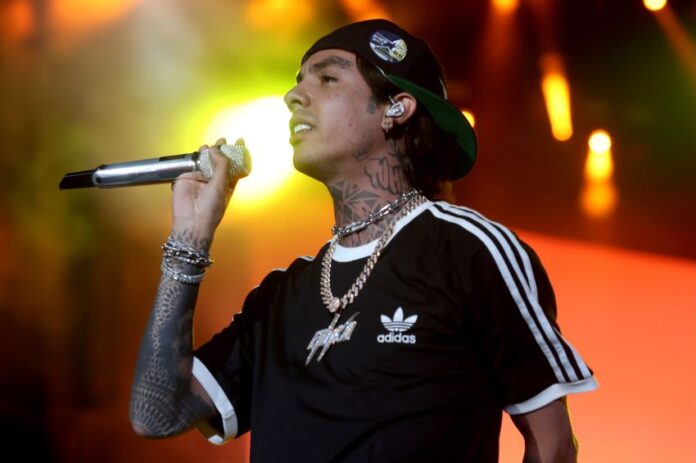Mexican singer Natanael Cano has been placed under government protection following threats allegedly made by the Los Mata Salas criminal group.
The threats were displayed on a narcomanta (narco banner) hung outside a high school in the northern Mexico city of Hermosillo, Sonora during the early hours of Jan. 5. The banner accused Cano and fellow regional Mexican artists Tito Torbellino Jr. and Javier Rosas of supporting the rival Los Salazar group.
Los Matasalas, célula de Los Chapitos amenazaron con ej3cutar a los cantantes Natanael Cano y Javier Rosas por apoyar a Los Salazar en Sonora.
A #NatanaelCano no le importa esto y se burla del nærco en sus historias de Instagram. 😱@NatanaelCan0Sinned 👀 pic.twitter.com/b18sB0uVrp
— Run Run TV 👀 (@SinnedTV) January 7, 2025
The banner warned the artist and other influencers from Hermosillo and the Sonora cities of Guaymas, Ciudad Obregón and Navojoa, that they would be targeted if they did not cease alleged financial and operational support for Los Salazar.
“Dedicate yourselves to what you do, which is the profession of musicians,” the message read. “This is not about making corridos, it is about collaborating financially and any illegal action. If you do not heed this warning, you will be shot.”
Cano performs ballads called narcocorridos that explore the cartel lifestyle and themes of drugs and violence.
State prosecutor Gustavo Rómulo Salas Chávez confirmed that protective measures have been granted to those named. “We will monitor their safety with the support of public security institutions to prevent any attacks,” Salas said.
Cano, whose biggest hit is his “Soy El Diablo” remix featuring Bad Bunny, is a pioneer of corridos tumbados music, a subgenre of songs that fuse the sharp, urban lyrics of reggaetón and hip-hop with the instrumentation and melodies of traditional Mexican music.
View this post on Instagram
President Claudia Sheinbaum recently went on the offensive against corridos tumbados and narcocorridos for glorifying the exploits of cartels, outlaws and criminal kingpins and for forgiving violence against women.
Saying such music is bad for Mexico, the president suggested a national contest in which corrido artists begin writing and performing “corridos” that promote values and culture. “They exalt ways of life linked to crime and cartels as if it were a life option — when they’re really a death option,” Sheinbaum said.
Cano, a 23-year-old native of Hermosillo, addressed the narcomanta (narco banner) threats against him in a now-deleted Instagram post. Sharing a photo of two blankets (mantas), he titled his post “The only blankets that worry me right now” and used a laugh emoji. “And if they will keep me warm,” he added.
His defiant tone divided public opinion, with some applauding his irreverence and others criticizing him for downplaying the seriousness of the situation.

While this is the first time Cano has been directly threatened by organized crime, narcoculture artists have faced similar incidents in the past. In 2023, Peso Pluma canceled several concerts after death threats, including one written on a narco banner in Tijuana that used the signature “CJNG,” a reference to the Jalisco New Generation Cartel.
The newspaper El País reported that Los Mata Salas — the criminal group that allegedly threatened Cano — has had violent confrontations with Los Salazar in recent years over drug trafficking and territorial control. Reportedly, each group used to work under the Sinaloa Cartel but are now loyal to offshoot groups.
Their rivalry has fueled Sonora’s status as a flashpoint in Mexico’s cartel wars; the state is just north of violence-plagued Culiacán, Sinaloa.
Despite the threats to the musicians, officials emphasized that the investigation does not aim to restrict artistic freedom. “We are committed to protecting their safety while respecting their freedom of expression,” Salas stated.
